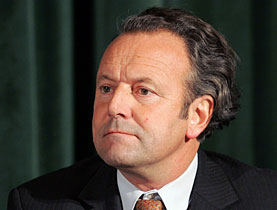A milestone year ends for banking secrecy

Swiss banking secrecy has been enshrined in law for 75 years but 2009 marked a turning point in the practice as it came under massive international pressure.
How it will evolve in 2010 will depend on the stance taken by the government and the Swiss voters, two experts told swissinfo.ch.
The year saw two major shifts in the history of Swiss banking secrecy.
In August, in violation of Swiss law, the UBS bank was forced to hand over customer data to the United States Internal Revenue Service after admitting that it had aided some US citizens to evade taxes.
Earlier in the year, Switzerland had to abandon its cherished distinction between tax evasion and tax fraud – used for deciding in which cases to share information – and agree to comply with an international system of cooperation in exchanging client data
To set the change in motion, the government has negotiated revisions to its double taxation agreements with a number of countries.
But before they come into force, both chambers of parliament have to approve them. The first ones should have gone through parliament’s scrutiny by the summer. However, even that may not be the end: opponents will still have the option of trying to call a referendum to give the Swiss people the last word on whether the agreements should be ratified or not.
Banking circles would certainly be unhappy if that happened, whatever the result: if voters rejected the agreements, it would damage Switzerland’s credibility, but if they accepted them, it could undermine negotiators in their fight to defend banking secrecy, according to tax lawyer Philippe Kenel, who is based in Switzerland and Brussels.
“Complete abandonment”
Henri Torrione, a tax law professor at Fribourg University, explained to swissinfo.ch that nothing would change for Swiss residents as their home tax authorities could not request information about them from banks, except in cases of fraud.
But for non-residents, information will be communicated to the relevant tax authorities, even for the simple act of failing to declare income. Assessment of the banking secrecy situation will ultimately depend on how double taxation agreements are interpreted.
Torrione described the government’s approach as “cautious”. “Its tactic is to say that an approach which does not include a client’s name and bank amounts to a [so-called] fishing expedition, which is not a basis for information exchange. If this tactic succeeds, it will de facto retain bank secrecy vis-à-vis foreign tax authorities. But I very much doubt that it will work.”
As far as Torrione is concerned, the change of policy decided by the cabinet when it adopted the standards laid down by the Organisation for Economic Co-operation and Development implies “a complete abandonment of secrecy”.
In its double taxation agreement with France, Switzerland agreed that the authorities should specify the name of the bank “if possible” when applying for client data, Torrione pointed out. “If the French authorities cannot provide it, Switzerland will still be obliged to supply information.”
Unrealistic expectations
Under the double taxation agreement with the US, the client will “typically” be identified by a name provided by the IRS. In other words, there may be exceptions, said Torrione. In the case of UBS, Switzerland agreed to provide information in cases of tax evasion, without obtaining the names beforehand.
“To think that Americans have reached an agreement with Switzerland that will prevent them from getting as much as in the past is unrealistic,” he said.
For Torrione, the government’s “cautious” interpretation of the rules governing the exchange of information will make it “very vulnerable” in the future battle over automatic exchange which the European Union is soon likely to demand.
“To defend itself against the automatic exchange of data, Switzerland must comply fully with exchange on request. It must take a clear, logical, coherent stance in line with OECD rules,” said Torrione.
Stability
According to Kenel, nothing has changed for the prudent customer. “But for those who keep their bank details at home or cross the border with money or documents, then yes, they are taking a risk. For them, bank secrecy has taken a battering.”
He agrees that the clause “if possible” in the France tax accord is a “huge mistake”. But with other countries, “the situation is clear, the name of the bank is required”.
Kenel says the question is rather whether bank secrecy has survived in the minds of customers. “It’s basically a psychological phenomenon. And it is clients who will decide whether they have faith in it or not. The real issue is there.”
“To judge by their reactions, it has been affected. French customers, for example, who leave France to settle in Switzerland, no longer trust it, even if in fact they are as well protected as before.”
To regain that trust, things need to regain some stability.
At this stage, Kenel tells his customers that the pressures on the banking secrecy will continue.
“But the Swiss government will never yield on the issues of the automatic exchange of information. If there was a vote on automatic exchange imposed by other states, the people would reject it. Today, customers’ security is the Swiss people!”
Pierre-François Besson, swissinfo.ch (Adapted from French by Jessica Dacey)
Switzerland has decided to refuse the automatic exchange of information.
Administrative assistance is granted on a case by case basis in response to specific requests and justified.
“Fishing expeditions” – where tax authorities request information without having grounds for suspicion – are prohibited.
The exchange of information is limited to taxes covered by the relevant double taxation agreements.
Under existing laws, banking secrecy obliges banks to keep information about their clients confidential, except in cases of criminal investigation.
The idea is anchored in legislation passed in 1934 after the global turbulences caused by Wall Street’s 1929 crash.
February – UBS is authorised by the Swiss authorities provide the United States with the identity of 255 customers it helped evade the IRS – without waiting for a decision on appeals filed by these clients (a violation of the law on banking secrecy).
March – The government announces its decision to relax banking secrecy in order to comply with international standards set by the OECD on the exchange of information. The government announces the renegotiation of double taxation accords. International assistance will be granted in cases of tax fraud, but also for offenses involving tax evasion.
April – The G20 puts the pressure on Switzerland by placing it on a grey list of uncooperative tax havens.
August – Switzerland and the US reach an agreement on UBS. The Americans request details of 52,000 account holders. A deal is reached to provide data of 4,450 accounts.
September – After 12 revised double taxation accords are signed, Switzerland is removed from the OECD grey list.
November – The government proposes to parliament that the people should be given the right to approve each new double taxation agreement via a referendum.

In compliance with the JTI standards
More: SWI swissinfo.ch certified by the Journalism Trust Initiative















You can find an overview of ongoing debates with our journalists here . Please join us!
If you want to start a conversation about a topic raised in this article or want to report factual errors, email us at english@swissinfo.ch.